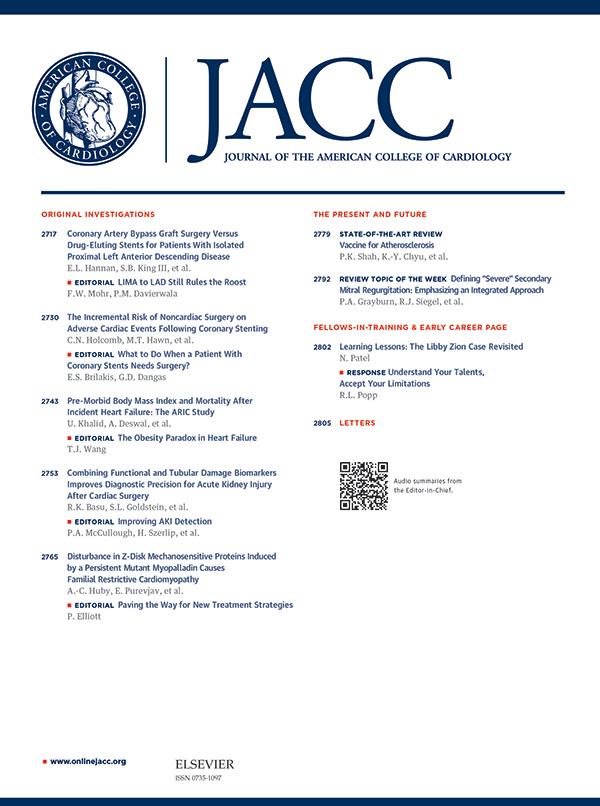Prevalence and Impact of Recurrent Rejection on Pediatric Heart Transplant Recipients
IF 21.7
1区 医学
Q1 CARDIAC & CARDIOVASCULAR SYSTEMS
引用次数: 0
Abstract
Background
Studies evaluating the prevalence and impact of recurrent rejection (RR) in pediatric heart transplant (HT) are sparse.
Objectives
The purpose of this study was to describe prevalence and impact of RR on cardiac allograft vasculopathy (CAV) and graft loss after pediatric HT.
Methods
Data on HT from January 1, 2000, to June 30, 2020, in the Pediatric Heart Transplant Society database were included. Freedom from RR (≥2 rejection episodes) was compared by era (early: 2000-2009; current: 2010-2020). Outcomes for children experiencing RR were compared with those experiencing 0 or 1 rejection episodes and by type of RR (antibody-mediated rejection [AMR], acute cellular rejection [ACR], mixed [ACR/AMR]).
Results
Of 6,342 HT recipients, 1,035 (17%) experienced RR. In the current era, pediatric HT recipients were less likely to experience RR (P < 0.001). Freedom from CAV was similar for those experiencing RR to those experiencing 0 or 1 episode (96.6% vs 95.3% vs 96.6%); and similar regardless of the type of RR (AMR, ACR, or mixed) (65.5% vs 82.9% vs 100%) (P > 0.05). Freedom from graft loss was significantly lower for those experiencing RR to those experiencing 0 or 1 episode (56.3% vs 72.3% vs 82.3%) and lower for those experiencing recurrent mixed rejection or recurrent AMR compared with those experiencing recurrent ACR (65.3% vs 50% vs 81.8%). Black children experiencing RR subsequently had lower freedom from CAV and graft loss than White children (P < 0.05 for all).
Conclusions
Although prevalence of RR has decreased, children experiencing RR are at greatly increased risk for losing their graft, particularly those who have recurrent mixed or antibody-mediated rejection.
复发性排斥反应对小儿心脏移植受者的影响:PHTS多机构分析
背景评估小儿心脏移植(HT)中复发性排斥反应(RR)的发生率和影响的研究很少。目的本研究旨在描述小儿心脏移植术后复发性排斥反应的发生率及其对心脏异体移植血管病变(CAV)和移植物损失的影响。按年代(早期:2000-2009年;当前:2010-2020年)比较RR(≥2次排斥反应)的发生率。结果 在 6,342 例 HT 受者中,1,035 例(17%)经历了 RR。在当今时代,儿科 HT 受者出现 RR 的可能性较低(P < 0.001)。经历过 RR 的受者与经历过 0 次或 1 次 RR 的受者免于 CAV 的比例相似(96.6% vs 95.3% vs 96.6%);无论 RR 的类型(AMR、ACR 或混合型)如何,免于 CAV 的比例也相似(65.5% vs 82.9% vs 100%)(P > 0.05)。经历过RR的患儿与经历过0次或1次RR的患儿相比,移植物免于丢失的比例明显较低(56.3% vs 72.3% vs 82.3%);经历过复发性混合排斥反应或复发性AMR的患儿与经历过复发性ACR的患儿相比,移植物免于丢失的比例也较低(65.3% vs 50% vs 81.8%)。结论虽然RR的发生率有所下降,但发生RR的儿童失去移植物的风险大大增加,尤其是那些复发性混合排斥或抗体介导排斥的儿童。
本文章由计算机程序翻译,如有差异,请以英文原文为准。
求助全文
约1分钟内获得全文
求助全文
来源期刊
CiteScore
42.70
自引率
3.30%
发文量
5097
审稿时长
2-4 weeks
期刊介绍:
The Journal of the American College of Cardiology (JACC) publishes peer-reviewed articles highlighting all aspects of cardiovascular disease, including original clinical studies, experimental investigations with clear clinical relevance, state-of-the-art papers and viewpoints.
Content Profile:
-Original Investigations
-JACC State-of-the-Art Reviews
-JACC Review Topics of the Week
-Guidelines & Clinical Documents
-JACC Guideline Comparisons
-JACC Scientific Expert Panels
-Cardiovascular Medicine & Society
-Editorial Comments (accompanying every Original Investigation)
-Research Letters
-Fellows-in-Training/Early Career Professional Pages
-Editor’s Pages from the Editor-in-Chief or other invited thought leaders

 求助内容:
求助内容: 应助结果提醒方式:
应助结果提醒方式:


